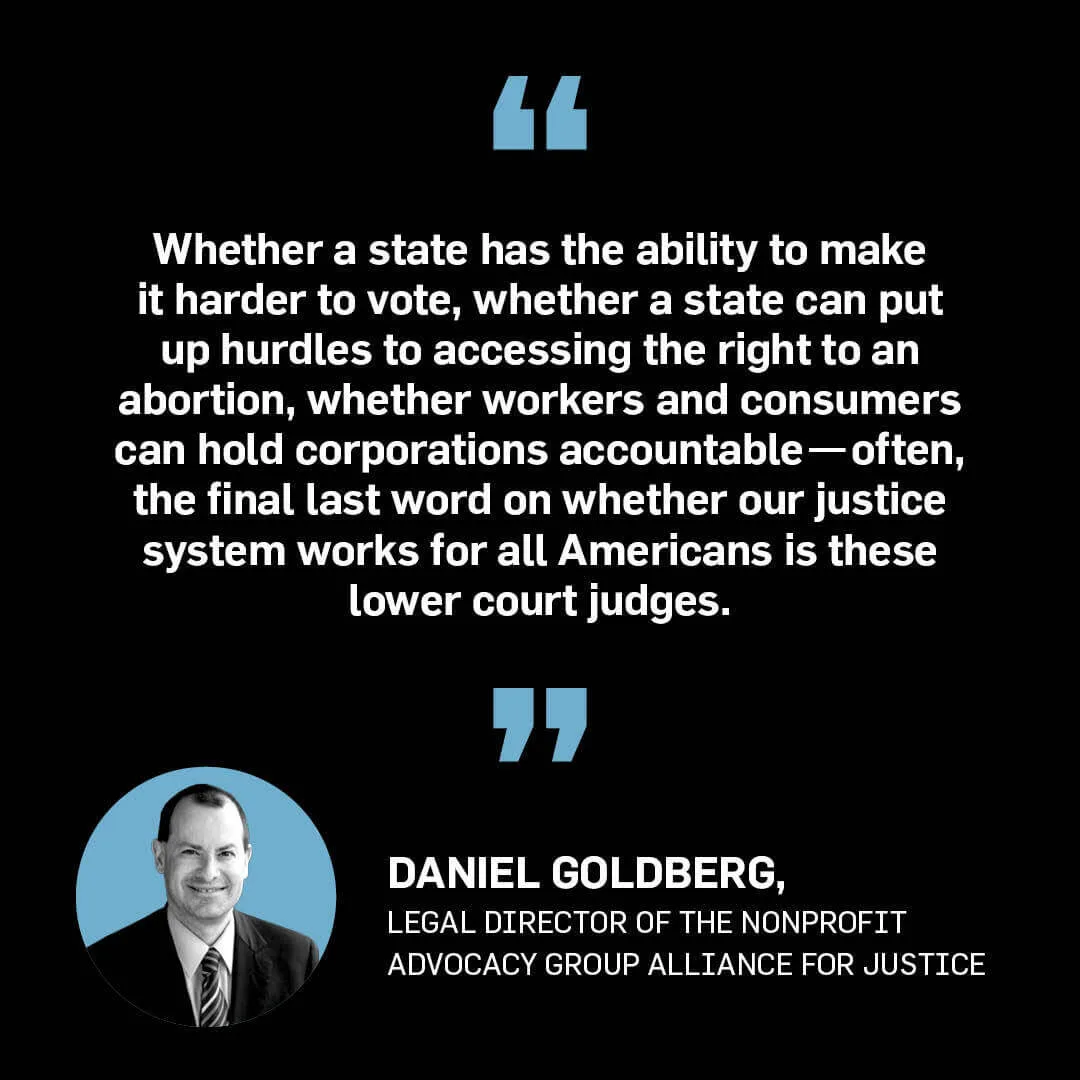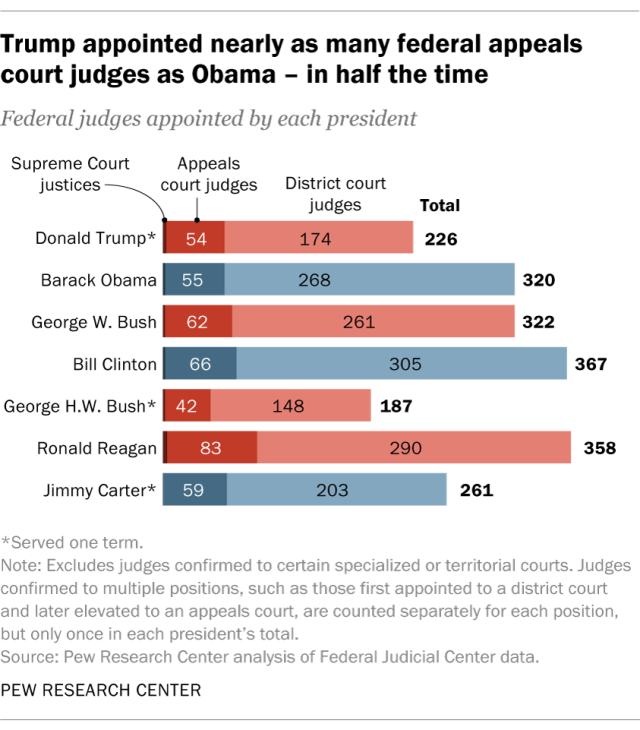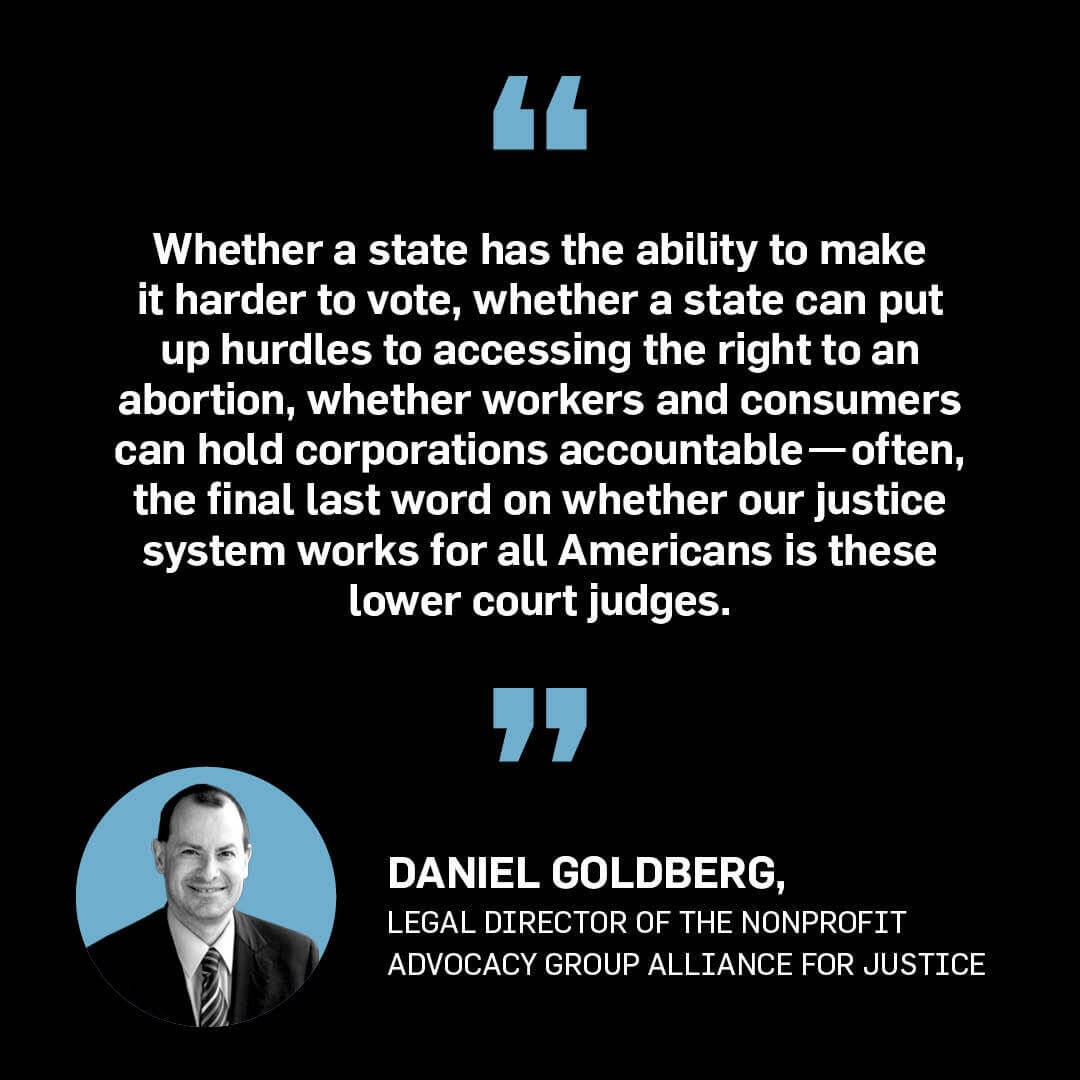
Former President Donald Trump’s makeover of the judicial system poses an existential threat to President Joe Biden’s entire agenda and ordinary Americans, according to progressive legal experts.
In November, amid a devastating public health crisis, the US Supreme Court heard oral arguments in a case brought by a coalition of Republican states seeking to strike down the Affordable Care Act, and with it, health care for 23 million Americans.
The Court may not issue a decision until as late as June. Until that happens, tens of millions of people will live in uncertainty, waiting to see whether they end up losing their insurance, protections for their pre-existing conditions, and coverage for essential preventative services.
But all of this could have been avoided. The case might not have even made its way to the Supreme Court if not for the decisive vote of a conservative judge on the US Court of Appeals for the 5th Circuit. After hearing Texas v. United States in 2019, Judge Kurt Engelhardt cast the key vote to keep the lawsuit alive.
In doing so, Engelhardt, who was confirmed to his seat in 2018, showed the power that lower court judges hold over ordinary Americans. His vote also underscored the potential long-term impact of former President Donald Trump’s makeover of the American court system.
Trump Stacked the Courts With White, Male Judges
During his four-year term, Trump appointed three Supreme Court justices (compared to just two during former President Barack Obama’s eight years), 54 appeals court justices (Obama only appointed 55), and 174 district court judges (268 for Obama). More than a quarter of currently active federal judges are Trump appointees.

This barrage of judicial appointments reflected a concerted effort by Republicans to entrench their power through the court system—power that poses an existential threat to President Joe Biden’s entire agenda and will come at the expense of ordinary Americans, according to progressive legal experts.
“The country is facing a range of emergencies, including no time left on the climate clock, 30,000 gun deaths a year, Black and brown voters being blocked from the polls by the millions, and a broken immigration system,” Aaron Belkin, director of the progressive organization Take Back the Court, told COURIER. “The stolen Supreme Court and lower federal courts will not allow President-elect Biden and the next Congress to address those emergencies.”
Trump’s ability to stack the courts, of course, was only made possible by then-Senate Majority Leader Mitch McConnell (R-Kentucky), who obstructed many of Obama’s court appointments, including his attempt to nominate Merrick Garland to the Supreme Court in 2016—the “stolen” seat Belkin is referring to. Trump later filled that vacancy with Neil Gorsuch, whom the Republican-controlled Senate confirmed in April 2017. Over the next four years, the chamber went on to install 226 more judges nominated by Trump.
While much attention has been paid to Supreme Court appointments, the Court only hears about 70-80 cases per year. In contrast, roughly 48,000 cases were filed in federal courts of appeals and over 375,000 were filed in district courts in 2019. Even though many Americans may not pay attention to the lower courts, it’s almost always these appeals and district court judges that have the final say over important cases directly affecting their lives.
“If somebody believes they are a victim of discrimination in their workplace, the final say on whether our civil rights laws are properly enforced is a lower court judge,” Daniel Goldberg, legal director of the nonprofit advocacy group Alliance for Justice, told COURIER. “Whether a state has the ability to make it harder to vote, whether a state can put up hurdles to accessing the right to an abortion, whether workers and consumers can hold corporations accountable—often, the final last word on whether our justice system works for all Americans is these lower court judges.”
It’s not just that Trump reshaped the courts that’s got Goldberg, Belkin, and others sounding the alarm bells; it’s who he reshaped them with. The former president’s appointees were extremely conservative and incredibly homogenous, with 76% being male and 84% being white, according to a recent Pew Research Center analysis of Federal Judicial Center data. Only one of Trump’s appointees is openly LGBTQ.
The Radical Views of Trump’s Judges
According to Belkin, Trump and McConnell’s rush to fill those vacancies with “extreme and often unqualified, white, straight, male, cisgender, heterosexual, young, conservative radicals” will harm “everyday Americans, people of color, workers, and women in order to promote the interests of corporations and plutocrats” for decades.

These judicial nominees have “demonstrated commitments to advancing a dangerous agenda, one that is focused on taking away access to health care, to eroding civil rights, equality for women and LGBTQ Americans, eviscerating protections for workers, consumers, and clean air and clean water, and undermining our democracy,” Goldberg added.
Many of these judges were confirmed despite having controversial and extreme records on issues:
- As a college and graduate student, Steve Menashi denounced college anti-rape activists as “campus gynocentrists,” accused an LGBTQ civil rights group of exploiting the murder of Mathew Shepard for “both financial and political benefit,” and compared the practice of gathering racial data for college admissions to the Nazi “Nuremberg laws.” Menashi also opposed need-based financial aid, claiming that it “punishes families with the foresight and prudence to save for their children’s education.” Menashi is now a judge on the US Court of Appeals for the Second Circuit.
- Chad Readler, then an attorney, defended the Trump administration’s largely denounced child-separation policy, questioned the legality of the ACA’s protection of Americans with pre-existing medical conditions, worked to undermine voting rights, and tried to chip away at the right to a public education from Ohio’s state constitution. Readler is now a judge on the US Court of Appeals for the Sixth Circuit.
- As an attorney, Kyle Duncan defended North Carolina’s photo ID law, which the Court of Appeals for the Fourth Circuit ruled targeted Black voters “with almost surgical precision.” He also repeatedly defended Louisiana’s ban on gay marriage before the Supreme Court prohibited state bans on gay marriage in 2015. Duncan is now a judge on the US Court of Appeals for the Fifth Circuit.
Trump’s appointees did not become any less conservative in their beliefs after taking the bench, either:
- Four Trump-appointed judges on the Sixth Circuit—Amul Thapar, Joan Larsen, John Nalbandian, and Eric Murphy—argued that residents of Flint, Michigan, should not be allowed to sue government leaders who had exposed them to lead-contaminated drinking water.
- Five Trump appointees on the Eleventh Circuit reversed a lower court decision, instead upholding an effective “poll tax” on former felons in Florida who had their right to vote restored by a referendum passed during the 2018 elections.
- Eleventh Circuit Judges Barbara Lagoa and Britt Grant held that measures passed in Palm Beach County and Boca Raton, Florida, banning therapists from performing conversion therapy on minors were violations of the First Amendment.
“The reality is that they are implementing the dangerous, Republican Party, ultra-conservative agenda from the bench,” Goldberg said.
Belkin believes that these judges will continue to chip away at Roe v. Wade and the legal right to abortion, erode rights and protections for LGBTQ individuals, and uphold voter suppression efforts that target people of color.
How Biden Plans to Navigate the Judiciary
To address this, Take Back the Court and other progressive groups like Demand Justice have argued that Biden needs to embrace expanding both the Supreme Court and the lower courts—an idea the president has thus far been reluctant to endorse. Biden is moving forward with creating a bipartisan commission to study reforms, though that effort has drawn some skepticism from progressives, who remain committed to court expansion.
In a letter dated Jan. 12, Take Back the Court, Demand Justice, and five other progressive organizations urged the president to fill the commission “exclusively of members who acknowledge the need for structural reform of the courts.”
Goldberg, meanwhile, praised Biden’s efforts thus far, which include a December letter (first obtained by HuffPost) to Senate Democrats asking them to recommend a diverse set of judges—not only with regards to race or gender, but also professional background—and to work with him to confirm them as fast as possible.
RELATED: Republicans Have Been Packing the Courts Since Trump Took Office
Goldberg viewed the letter as a “fantastic sign” that made clear Biden is prioritizing the nomination and confirmation of federal judges. With Biden now in the White House, that effort is picking up steam.
But unless Biden expands the courts, he is unlikely to have the same kind of impact Trump did. There are currently only 60 vacancies across the US court system, 52 of which are at the district level. More vacancies could open up, however, if older liberal judges step back from active service and allow Biden to appoint their successors.
There is another silver lining, too, according to Goldberg. “Progressives are energized like never before, and are ready to prioritize the courts in a manner that might not have been done during prior Democratic administrations,” he said.
What impact that has exactly remains to be seen, but the stakes could not be clearer. Just three weeks into his term, Biden is already experiencing pushback from the Trump judges. Judge Drew Tipton—who was confirmed to the US District Court for the Southern District of Texas last summer—temporarily blocked the Biden administration’s plan to pause most deportations for 100 days while they conduct a full review of immigration enforcement.
While Tipton considers whether to issue a longer ban on Biden’s order—a request from Texas’s Republican Attorney General Ken Paxton—the lives of thousands of immigrants hang in the balance.
READ MORE: Without Explanation, the Supreme Court Revives Restrictions on Abortion Pill

He said what? 10 things to know about RFK Jr.
The Kennedy family has long been considered “Democratic royalty.” But Robert F. Kennedy, Jr.—son of Robert F. Kennedy, who was assassinated while...

Here’s everything you need to know about this month’s Mercury retrograde
Does everything in your life feel a little more chaotic than usual? Or do you feel like misunderstandings are cropping up more frequently than they...

Arizona expects to be back at the center of election attacks. Its officials are going on offense
Republican Richer and Democrat Fontes are taking more aggressive steps than ever to rebuild trust with voters, knock down disinformation, and...

George Santos’ former treasurer running attack ads in Arizona with Dem-sounding PAC name
An unregistered, Republican-run political action committee from Texas with a deceptively Democratic name and ties to disgraced US Rep. George Santos...




